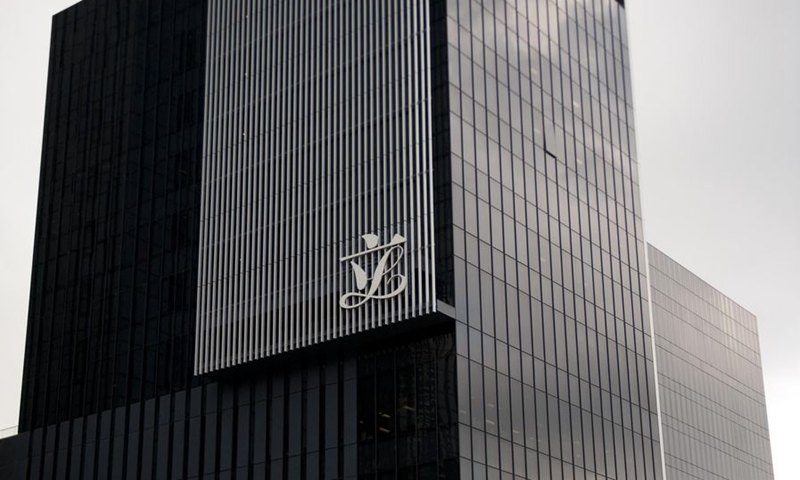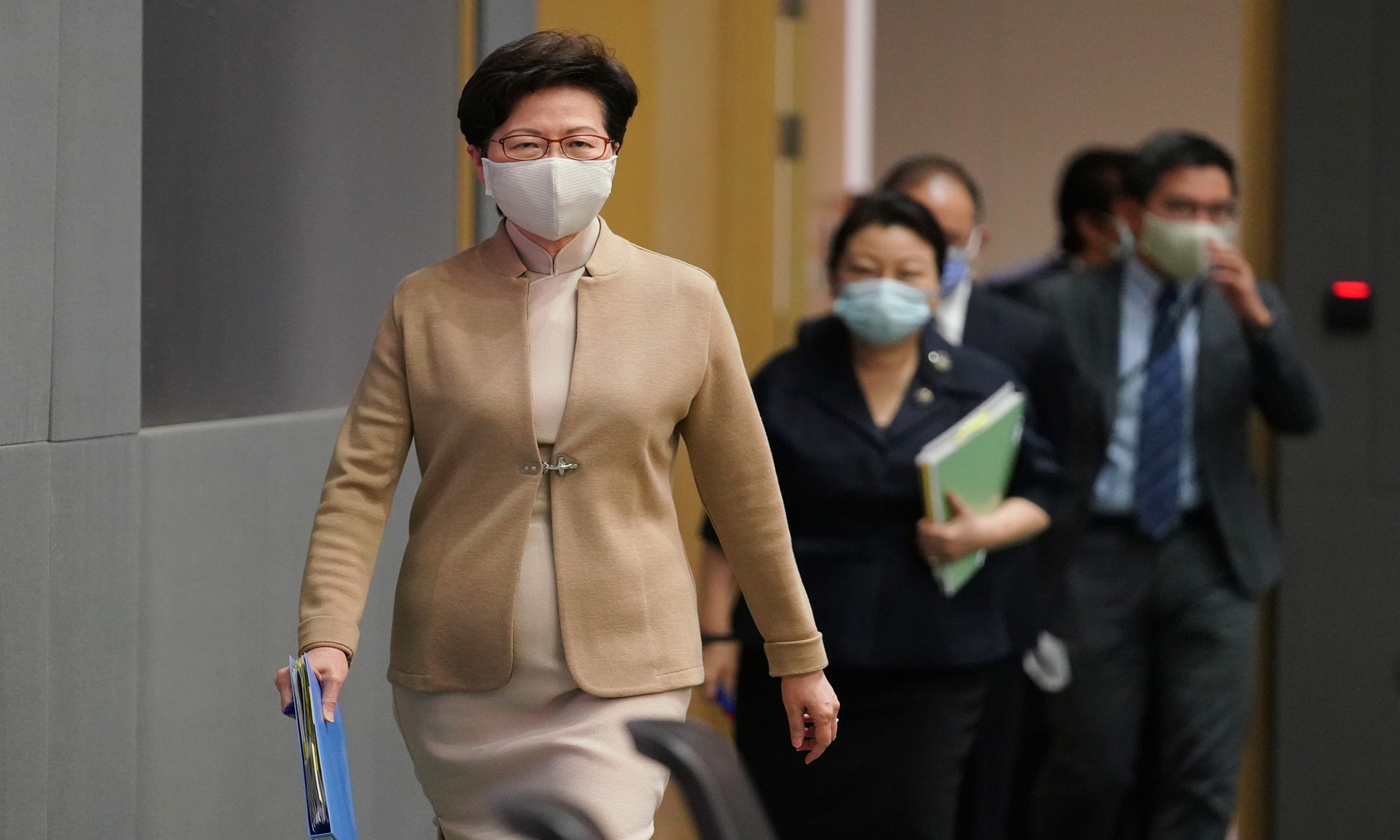HK opposition lawmakers’ mass resignation ‘political maneuver,’ central govt prepared for all scenarios
By GT staff reporters Source: Global Times Published: 2020/11/11 18:42:38 Last Updated: 2020/11/12 12:18:05
LegCo not a ‘rubber stamp,’ will keep operating, supervising

Legislative Council (LegCo) building of China's Hong Kong Special Administrative Region. (Xinhua)
After four opposition lawmakers were disqualified from the legislature in Hong Kong on Wednesday, which was in line with the latest legal opinion given by China's top legislature, the remaining 15 opposition members of LegCo announced they were resigning en masse. Such a political maneuver, as some observers said, won't affect LegCo operations.
The mass resignation was announced after the National People's Congress (NPC) Standing Committee formulated a set of arrangements, including the standards for disqualifying Hong Kong LegCo lawmakers.
The lawmakers are protesting the disqualification of opposition lawmakers Alvin Yeung Ngok-kiu, Kwok Ka-ki, Dennis Kwok Wing-hang and Kenneth Leung Kai-cheong, who have notorious records for creating trouble at LegCo and were also disqualified by the Electoral Affairs Commission (EAC) in July for failing to meet the requirements of the elections.
The Hong Kong Special Administrative Region (HKSAR) government disqualified the four opposition LegCo members based on the top legislature's decision on Hong Kong lawmakers' qualifications to hold office adopted on Wednesday.
Prior to the mass resignation, Carrie Lam, chief executive of the HKSAR government, said at a press conference on Wednesday that the mass resignation won't affect other lawmakers performing their duties. She also ruled out claims that the legislature would become a "rubber stamp."
The opposition apparently overestimated the power of a mass resignation. The minimum number - known as "quorum" - of LegCo members shall be not less than one half of all its members. Hong Kong LegCo, despite the mass resignation of opposition lawmakers, can still operate, as most bills only need the approval of half of the total number of lawmakers, Tian Feilong, a Hong Kong affairs expert at Beihang University in Beijing, told the Global Times.
After these troublemaking opposition lawmakers leave LegCo, the legislature will be able to fully cooperate with the HKSAR government, advancing social, livelihood and economic policies at full speed, Lau Siu-kai, former policy adviser to the central government on Hong Kong policies and vice-president of the Chinese Association of Hong Kong and Macao Studies, told the Global Times.
"The top authority is also prepared for these so-called 'mass resignations' scenarios," Lau said.
The mass resignation is a commonly used tactic to show their "political posture," in hopes of generating sympathy for the next election and winning the support of Western forces, Li Xiaobing, an expert on Hong Kong affairs at Nankai University in Tianjin, told the Global Times on Wednesday.
Chinese mainland analysts said the act of "resigning en masse" proves that these opposition lawmakers have abandoned their supervisory role, and refused to play the role of the constructive opposition party in LegCo, but decided to go against the "one country, two systems" and provoke the top legislature of the country.
In response to opposition lawmakers' threat to carry out a mass resignation, Wang Wenbin, Foreign Ministry spokesperson, said at Wednesday's routine press conference that Hong Kong is China's special administrative region and the issues on Hong Kong lawmakers' qualifications are China's domestic affairs. Other countries have no right to point fingers or interfere with it.
Li said Western media don't understand how supervision works in Hong Kong, or pretend to be blind on what the opposition did in the past to interrupt the operations of the legislature, and refused to criticize their irresponsible acts.
"These opposition members are not the representative of all Hong Kong people, and have failed to fulfill their duties but only create chaos, and many of them are actually trying to undermine the system rather than construct it. So they are not supervising the government but just simply opposing everything proposed by the government and the pro-establishment camp," Li said.
Supervision is not equal to simply opposing everything, and the pro-establishment camp will also have differences with the HKSAR government and strictly play the role of supervision, he noted.
"If those Western critics understand this, they won't describe the LegCo as a 'rubber stamp' after the opposition members' resignation," he said.

Chief Executive of the Hong Kong Special Administrative Region (HKSAR) Carrie Lam holds a press conference on Wednesday. Lawmakers in the Legislative Council (LegCo) of the HKSAR should fulfill their responsibilities and pro-establishment lawmakers will not be a rubber stamp, she said. Photo: VCG
Basic Law, basic norms
The Liaison Office of the Central People's Government in the HKSAR said on Wednesday that it firmly supports the HKSAR government's announcement to disqualify four members of the LegCo based on the NPC decision.
The office said that this decision has drawn the bottom line and set a rule for those holding public offices in the HKSAR governance system to fulfill their constitutional obligation of pledging allegiance to the country and to Hong Kong.
It also provides the HKSAR legal support to carry out local legislative work under Article 104 of the HKSAR Basic Law.
The Article 104 of the Basic Law stipulates that when assuming office, the public officers including the chief executive, principle officials, members of the Executive Council and of the LegCo, judges of the courts at all levels and other members of the judiciary in the HKSAR must, in accordance with law, swear to uphold the Basic Law of the HKSAR. They should also swear allegiance to the HKSAR and China.
The NPC Standing Committee's decision also provides further an indication for local electoral officers to set stricter criteria for candidates to pursue positions of lawmakers, which shows the central government's overall jurisdiction over Hong Kong affairs, Tian Feilong, a Hong Kong affairs expert at Beihang University in Beijing, told the Global Times on Wednesday.
"This can be seen as a Hong Kong version of the 'patriotic act,' setting requirements for implementing 'one country, two systems' more properly," Tian said.
The four are also among 12 candidates who were disqualified for failing to meet the requirements of the LegCo elections, which should have been held in September, but were postponed for a year due to the COVID-19 outbreak, said the office, noting that since they have already been disqualified as lawmakers based on the top legislature's decision, they are no longer allowed to perform their duties at the sixth LegCo.
Echoing the liaison office's remarks, the Hong Kong and Macao Affairs Office of the State Council said that the NPC Standing Committee's decision has provided a solid legal basis for regulating and dealing with matters concerning the qualification of LegCo members, and its decision has unchallengeable legal authority.
The central government had intended to handle those four disqualified lawmakers in a more tolerant manner, hoping that they would change their behaviors and correct misdeeds, Lau noted.
"Following recent incidents, Beijing believed that the opposition camp has no intention of cooperating with the central government in a pragmatic way but to seek support from extreme forces, and their 'lam chau' or "burn with us" mentality and filibustering tactics have severely impeded the governance of Hong Kong," he said.
"Lam chau," which roughly means "self-destruct together," has become a commonly heard slogan among anti-government groups in Hong Kong to pursue their political goals.
The NPC Standing Committee aims to introduce a set of political standards that fit into the LegCo structure of the HKSAR, which is also in line with the core spirit of "one country, two systems," Lawrence Tang Fei, a member of the Chinese Association of Hong Kong and Macao Studies, told the Global Times.
Posted in: SOCIETY,HK/MACAO/TAIWAN